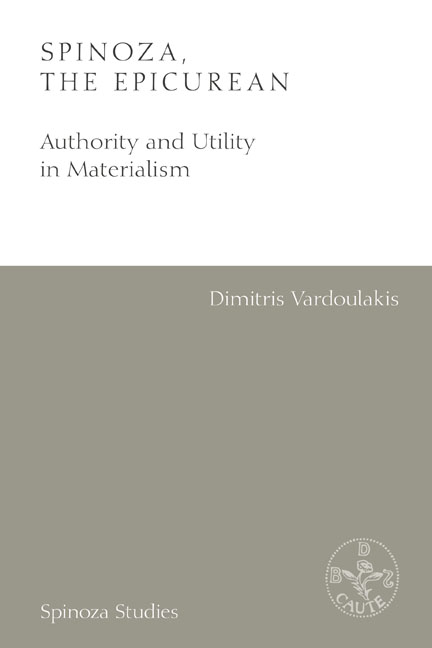Book contents
- Frontmatter
- Contents
- Reference Guide to Spinoza’s Work
- Acknowledgements
- Dedication
- Preamble
- Introduction: Why is Spinoza an Epicurean?
- 1 Freedom as Overcoming the Fear of Death: The Dialectic of Authority and Utility in the Preface
- 2 The Power of Error: Moses, the Prophets and the People (chapters 1, 2 and 3)
- 3 Philonomianism: Law and the Origin of Finitude (chapter 4)
- 4 Political Monism: The Primacy of Utility over Authority (chapters 5 and 6)
- 5 Love your Friend as Yourself: The Neighbour and the Politics of Biblical Hermeneutics (chapters 7 to 13)
- 6 The Freedom to Philosophize: The Two Paths to Virtue (chapters 14 and 15)
- 7 Fear and Power: Natural Right and Authorization in Spinoza and Hobbes (chapter 16)
- 8 Theocracy: On the State of Authority (chapters 17 and 18)
- 9 The Authority to Abrogate: The Two Paths to Virtue and the Internal Enemy (chapters 19 and 20)
- Conclusion: The Limitation of Spinoza’s Epicureanism
- Bibliography
- Index
1 - Freedom as Overcoming the Fear of Death: The Dialectic of Authority and Utility in the Preface
Published online by Cambridge University Press: 20 October 2020
- Frontmatter
- Contents
- Reference Guide to Spinoza’s Work
- Acknowledgements
- Dedication
- Preamble
- Introduction: Why is Spinoza an Epicurean?
- 1 Freedom as Overcoming the Fear of Death: The Dialectic of Authority and Utility in the Preface
- 2 The Power of Error: Moses, the Prophets and the People (chapters 1, 2 and 3)
- 3 Philonomianism: Law and the Origin of Finitude (chapter 4)
- 4 Political Monism: The Primacy of Utility over Authority (chapters 5 and 6)
- 5 Love your Friend as Yourself: The Neighbour and the Politics of Biblical Hermeneutics (chapters 7 to 13)
- 6 The Freedom to Philosophize: The Two Paths to Virtue (chapters 14 and 15)
- 7 Fear and Power: Natural Right and Authorization in Spinoza and Hobbes (chapter 16)
- 8 Theocracy: On the State of Authority (chapters 17 and 18)
- 9 The Authority to Abrogate: The Two Paths to Virtue and the Internal Enemy (chapters 19 and 20)
- Conclusion: The Limitation of Spinoza’s Epicureanism
- Bibliography
- Index
Summary
The first part of the subtitle of the Theological Political Treatise may have been easily acceptable to Spinoza's contemporaries: the book shows that ‘Freedom of Philosophizing can be allowed in Preserving Piety and the Peace of the Republic’. In the aftermath of the Reformation, this sentiment would not have been unfamiliar. The secular ideal of the separation of ecclesiastical from temporal authority requires that there is a division between the inner self that is subject to faith and receives the message of Scripture, and the external self that is subject to the authority of the sovereign and to the laws of the state. Mirroring this logic, philosophers and deists of various hues claim a private right to the freedom to philosophize – a right that is distinct from their public obligations to the state.
Although the first sentence of the subtitle should have come as no surprise to the general educated reader in the seventeenth century, the sentence that follows would most likely have been unnerving. The book, indicates Spinoza, also wants to argue that ‘it is not possible for such Freedom to be upheld except when accompanied by the Peace of the Republic and Piety Themselves’. Here, the freedom to philosophize acquires a public dimension. It is as if Spinoza is suggesting that the freedom to philosophize requires as a necessary precondition a well-functioning state and a pious Church. It is as if, further, the external condition – the public dimension of life – cannot be separated from the internal life of the mind. Freedom to philosophize isdetermined by the material conditions in which it unfolds. Such a materialism is not widely embraced by seventeenth-century readers.
The cumulative effect of the chiasmus of these two sentences of the subtitle suggests a radical position. It suggests that the absence of the freedom to philosophize would threaten the existence of a state and would make the Church impious.
- Type
- Chapter
- Information
- Spinoza, the EpicureanAuthority and Utility in Materialism, pp. 48 - 75Publisher: Edinburgh University PressPrint publication year: 2020



